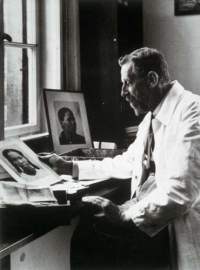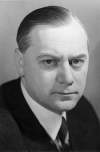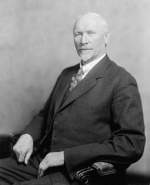
December 14 1896 Birth: James Doolittle: American aviator and World War II army general
1900 The birth of quantum theory: German physicist Max Planck publishes his groundbreaking study of the effect of radiation on a "blackbody" substance, and the quantum theory of modern physics is born. [For further information, click here]
1911 Birth: Hans Joachim Pabst von Ohain: German aeronautical engineer: Ohain, at age 22, conceived his theory of jet propulsion (1933) because to fly faster, airplanes could fly higher for lower air resistance, but there, propellers and piston engines worked badly. He saw turbojets as a solution, and took out his first patent on the gas-turbine jet engine in 1935, four years after Frank Whittle. By Sep 1937, Ohain had a hydrogen-fueled bench model producing a 250-km thrust. He designed the HeS3b turbojet engine that powered the first experimental jet aircraft, the He178, on its historic maiden flight at a top speed of about 350 mph on 27 Aug 1939, near Rostock, Germany. Whittle's first jet flew later, in 1941. After WW II, Ohain worked for the U.S. airforce (1947-79)." See: Wunderwaffen. 1913 Holocaust: Dr. Eugen Fischer's book Die Rehobother Bastards und das Bastardisierungsproblem beim Menschen (The Bastards of Rehoboth and the problem of miscegenation in Man) is published. In it he writes about the people of mixed blood in German South-West Africa: We should provide them with the minimum amount of protection which they require, for survival as a race inferior to ourselves, and we should do this only as long as they are useful to us. After this, free competition should prevail and, in my opinion, this will lead to their decline and destruction. Eugen Fischer was a German professor of medicine, anthropology and eugenics. He was one of those responsible for the Nazi German pseudoscientific theories of racial hygiene that sent an estimated half a million Genocide: Gypsies to their death in the Porajmos and led to the compulsory sterilization of hundreds of thousands of other individuals, deemed racially defective, such as the Rhineland Bastards, the mentally ill, and the mentally retarded. Born in Karlsruhe, Germany, Fischer joined the Nazi party soon after it was established. 1914 World War I: Britain breaks the German war code, so that "By the end of January 1915, [British Intelligence is] able to advise the Admiralty of the departure of each U-boat as it left for patrol." 1918 New king renounces Finnish throne: In the latest bump on Finland's rocky road from Swedish and Russian duchy to independent nation, the newly-crowned Frederick, German-born and the brother-in-law of Kaiser Wilhelm II, renounces the Finnish throne after barely two months. [For further information, click here]
1939 World War II: USSR expelled from the League of Nations:
On this day, the League of Nations, the international peacekeeping organization formed at the end of World War I, expels the Union of Soviet Socialist Republics in response to the Soviets' invasion of Finland on October 30.
Although the League of Nations was more or less the brainchild of President Woodrow Wilson, the United States, which was to have sat on the Executive Council, never joined. Isolationists in the Senate--put off by America's intervention in World War I, which they felt was more of a European civil war than a true world war--prevented American participation. While the League was born with the exalted mission of preventing another "Great War," it proved ineffectual, being unable to protect China from a Japanese invasion or Ethiopia from an Italian one. The League was also useless in reacting to German remilitarization, which was a violation of the Treaty of Versailles, the document that formally set the peace terms for the end of World War I.
Germany and Japan voluntarily withdrew from the League in 1933, and Italy left in 1937. The true imperial designs of the Soviet Union soon became apparent with its occupation of eastern Poland in September of 1939, ostensibly with the intention of protecting Russian "blood brothers," Ukrainians and Byelorussians, who were supposedly menaced by the Poles. Lithuania, Latvia, and Estonia were then terrorized into signing "mutual assistance" pacts, primarily one-sided agreements that gave the USSR air and naval bases in those countries. But the invasion of Finland, where no provocation or pact could credibly be adduced to justify the aggression, resulted in worldwide reaction. President Roosevelt, although an "ally" of the USSR, condemned the invasion, causing the Soviets to withdraw from the New York World's Fair. And finally, the League of Nations, drawing almost its last breath, expelled it.
1941 World War II: Various: North Africa: Dec 14-17 Polish Carpathian Brigade distinguishes itself at Battle of Gazala in Libya. Later they will fight in Italy with the Polish 2nd Corps. Countdown to Infamy: The notes of a conference between Hitler and Japanese Ambassador Oshima, held in the presence of Reich Foreign Minister Ribbentrop: First the Fuehrer presents Ambassador Oshima with the Grand Cross of the Order of Merit of the German Eagle in gold. With cordial words he acknowledges his services in the achievement of German-Japanese cooperation, which has now obtained its culmination in a close brotherhood of arms. General Oshima expresses his thanks for the great honor and emphasizes how glad he is that this brotherhood of arms has now come about between Germany and Japan. The Fuehrer continues: 'You gave the right declaration of war.' This method is the only proper one. Japan pursued it formerly and it corresponds with his own system, that is, to negotiate as long as possible. But if one sees the other is interested only in putting one of, in shamming and humiliating one, and is not willing to come to an agreement, then one should strike as hard as possible, indeed, and not waste time declaring war. It was heartwarming to him to hear of the first operations of the Japanese. He himself negotiated with infinite patience at times, for example, with Poland and also with Russia. When he then realized that the other did not want to come to an agreement, he struck suddenly and without formality. He would continue to go on this way in the future. Holocaust: Alfred Rosenberg raises the Jewish question with Hitler, who tells him that the Jews had brought this war on Germany, and caused the destruction, and that they had only themselves to blame if they had to suffer the consequences. From a statement by Hans Frank made to the political leaders of the NSDAP at Krakow: I will endeavor to get out of the reservoir of this territory everything that is yet to be had out of it. When you consider that it was possible for me to deliver to the Reich 600,000 tons of bread grain and in addition 180,000 tons to the Armed Forces stationed here; further, an abundance amounting to many thousands of tons of other commodities, such as seed, fats, vegetables, besides the delivery to the Reich of 300 million eggs, etcetera, you can estimate how important the work in this territory is for the Reich. In order to make clear to you the significance of the consignment from the Government General of 600,000 tons of bread grain, you are referred to the fact that the Government General, by this achievement alone, covers the raising of the bread ration in the Greater German Reich by two-thirds for the present rationing period. This enormous achievement can rightfully be claimed by us . . . . You know that we have delivered more than 940,000 Polish workers to the Reich. The Government General thereby stands absolutely and relatively at the head of all European countries. This achievement is enormous and has also been recognized as such by Gauleiter Sauckel. Stalin to FDR: I, too, express deep regret at not being able to leave the Soviet Union in the immediate future, or even in early March. Front affairs simply will not let me do so. Indeed, they necessitate my continuous presence. I do not know yet what were the specific matters that you, Mr. President, and Mr. Churchill wanted discussed at our joint conference. Could we not discuss them by correspondence until we have an opportunity to meet? I think we shall not differ. I feel confident that no time is being wasted, that the promise to open a second front in Europe, which you, Mr. President, and Mr. Churchill gave for 1942 or the spring of 1943 at the latest will be kept and that a second front in Europe will really be opened jointly by Great Britain and the USA next spring. With reference to the rumors about the Soviet attitude to the use of Darlan and people like him . . . I consider it an important achievement that you have succeeded in winning Darlan and others to the Allied side against Hitler. 1944 World War II: Various: Churchill to FDR: I will send you over the week-end a considered answer to your telegram, for the kindly tone of which I thank you. I hope that the British reinforcements now coming steadily into Attica may make a more healthy situation in Athens. You will realize how very serious it would be if we withdrew, as we easily could, and the result was a frightful massacre, and an extreme Left Wing regime under Communist inspiration installed itself, as it would, in Athens. My Cabinet colleagues here of all parties are not prepared to act in a manner so dishonorable to our record and name. Ernest Bevin's speech to the Labour conference won universal respect. Stern fighting lies ahead, and even danger to our troops in Athens. The fact that you are supposed to be against us, in accordance with the last sentence of Stettinius's Press release (5 December), has added, as I feared, to our difficulties and burdens. I think it probable that I shall broadcast to the world on Sunday night and make manifest the purity and disinterestedness of our motives throughout, and also our resolves. Smuts to Churchill: I am very distressed at the anxiety and trouble which the situation in Greece is causing you and the Cabinet . . . . We may, I fear, find, if private Partisan armies and underground movements are kept alive, the peace degenerating in civil convulsions and anarchy not only in Greece but elsewhere also in Europe. 1945 Nuremberg Tribunal: Continuation of Major Walsh's Presentation of the Case on Persecution of the Jews. Beginning of Captain Samuel Harris' Presentation of the Case Concerning Germanization and Spoliation in Occupied Countries. 1946 War Crimes Tribunal: Josef Kramer and 10 others are executed for crimes they committed at the Nazi concentration camps Belsen and Auschwitz. Edited by Levi Bookin (Copy editor) Click to join 3rdReichStudies FAIR USE NOTICE: This site may contain copyrighted material the use of which has not always been specifically authorized by the copyright owner. We are making such material available in our efforts to advance understanding of historical, political, human rights, economic, democracy, scientific, environmental, and social justice issues, etc. We believe this constitutes a 'fair use' of any such copyrighted material as provided for in section 107 of the US Copyright Law. In accordance with Title 17 U.S.C. Section 107, the material on this site is distributed without profit to those who have expressed a prior interest in receiving the included information for research and educational purposes. If you wish to use copyrighted material from this site for purposes of your own that go beyond 'fair use', you must obtain permission from the copyright owner. Please note that the list-owner and the moderators are not responsible for, and do not necessarily approve of, the random ads placed on our pages by our web server. They are, unfortunately, the price one pays for a 'free' website.





levi.bookin@gmail.com






